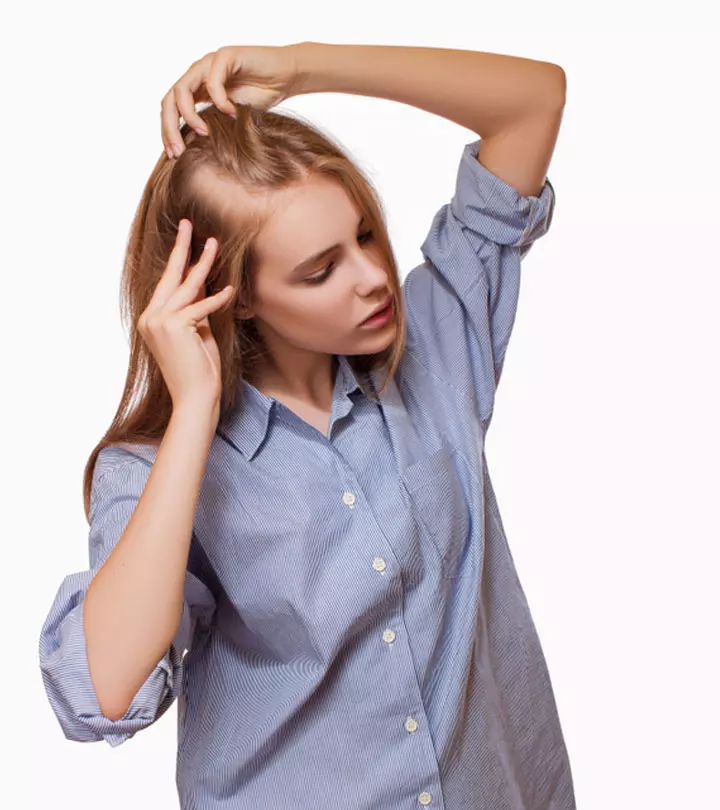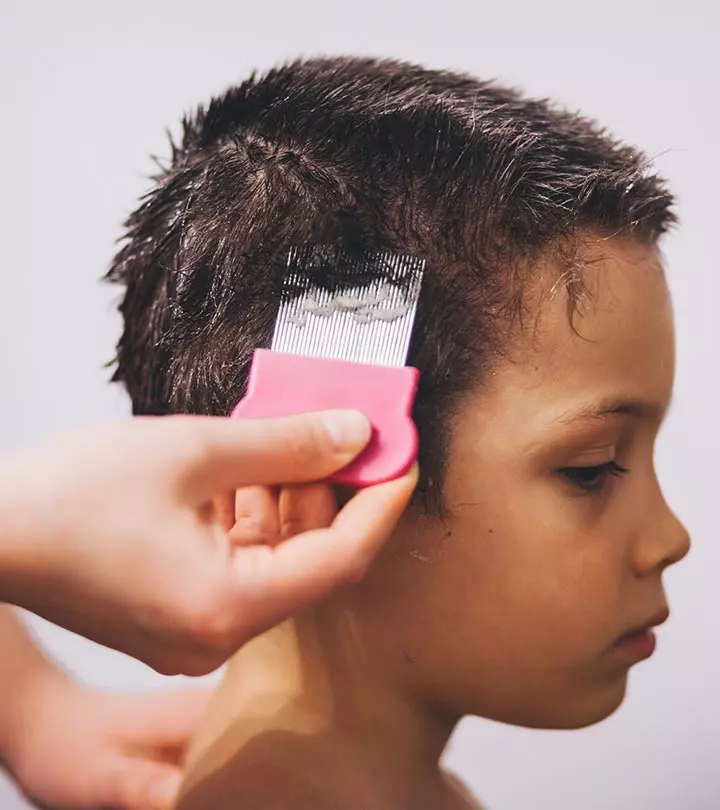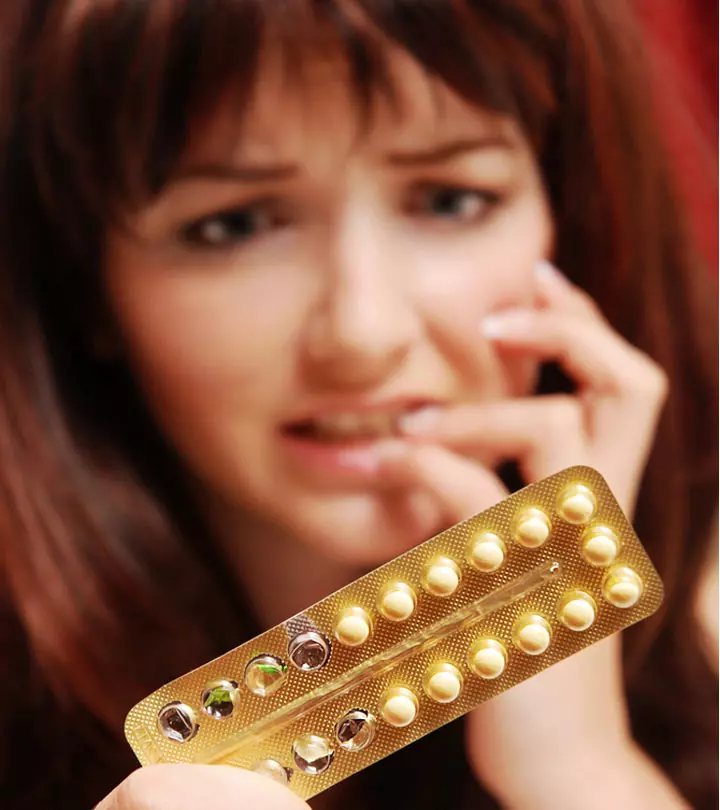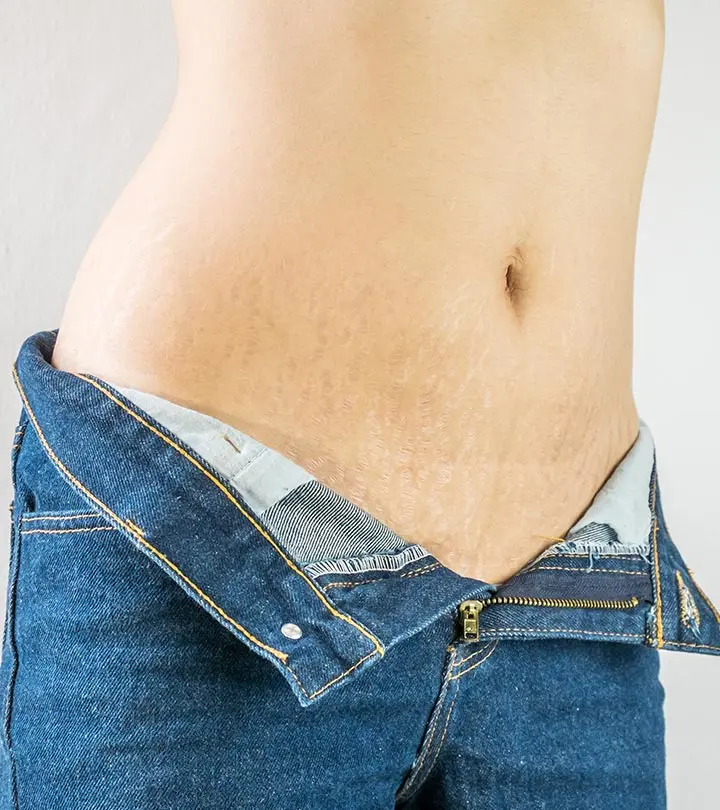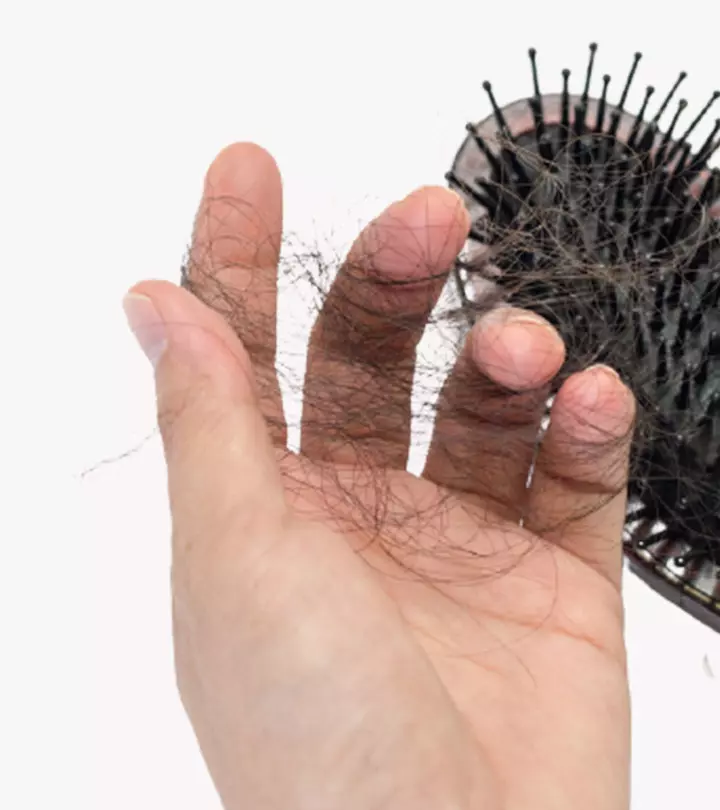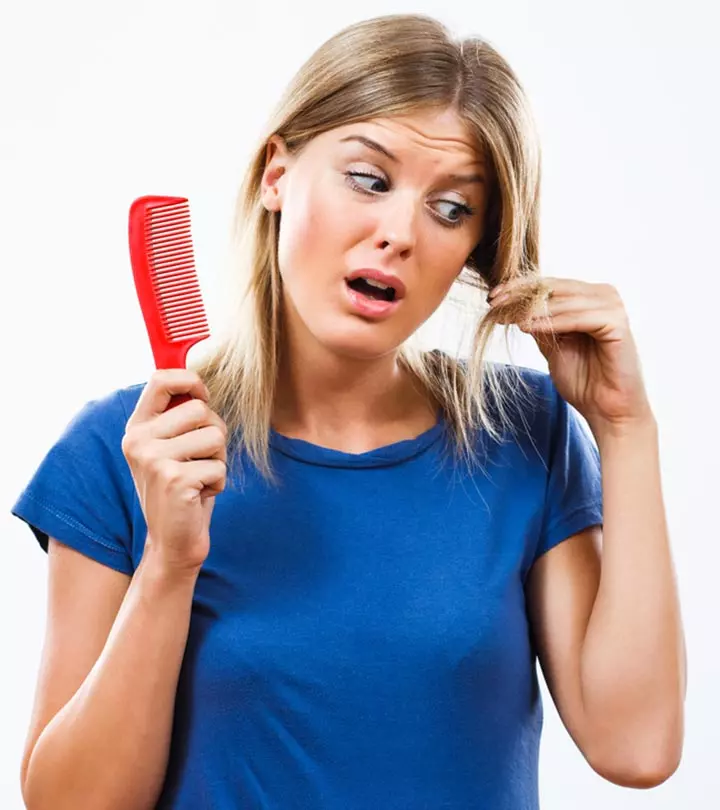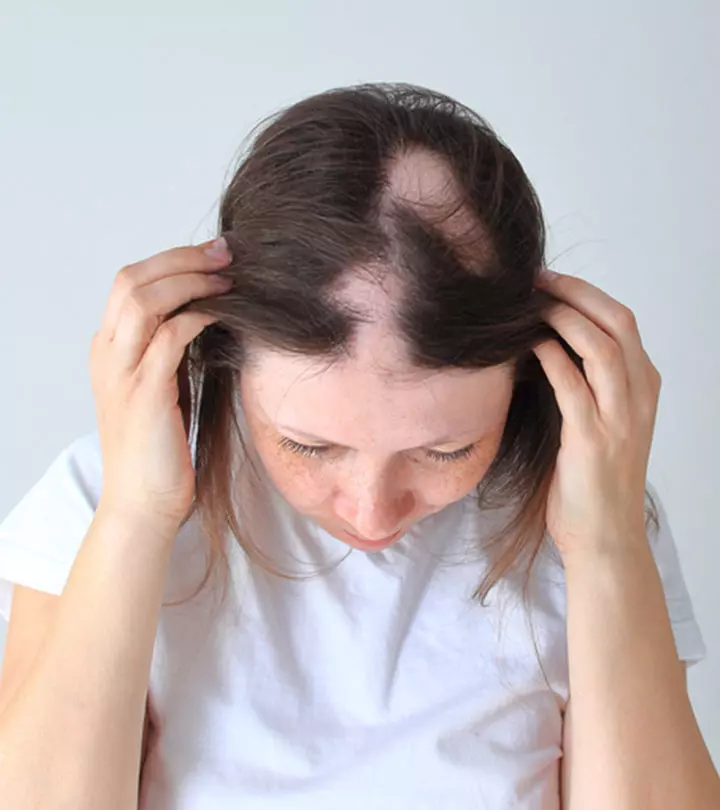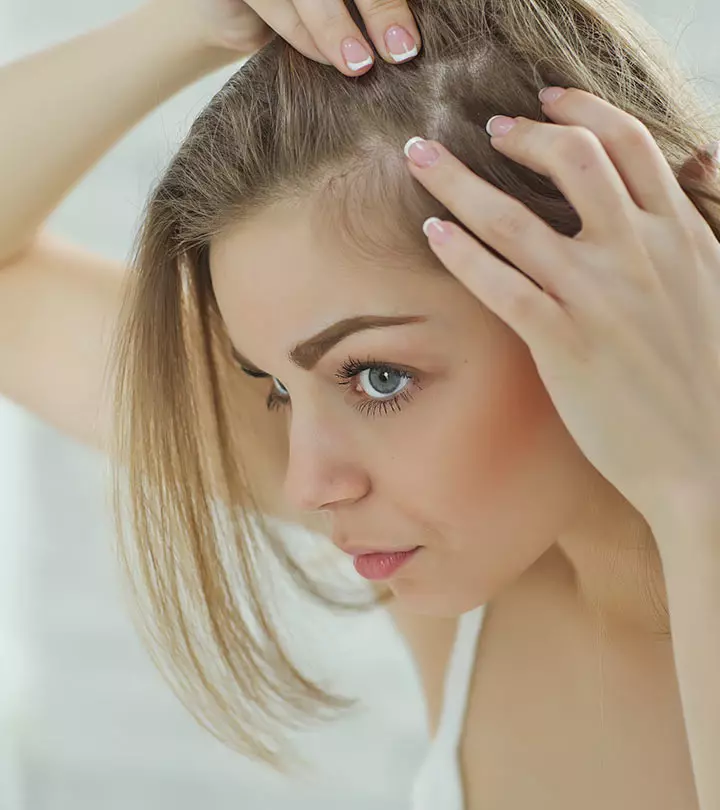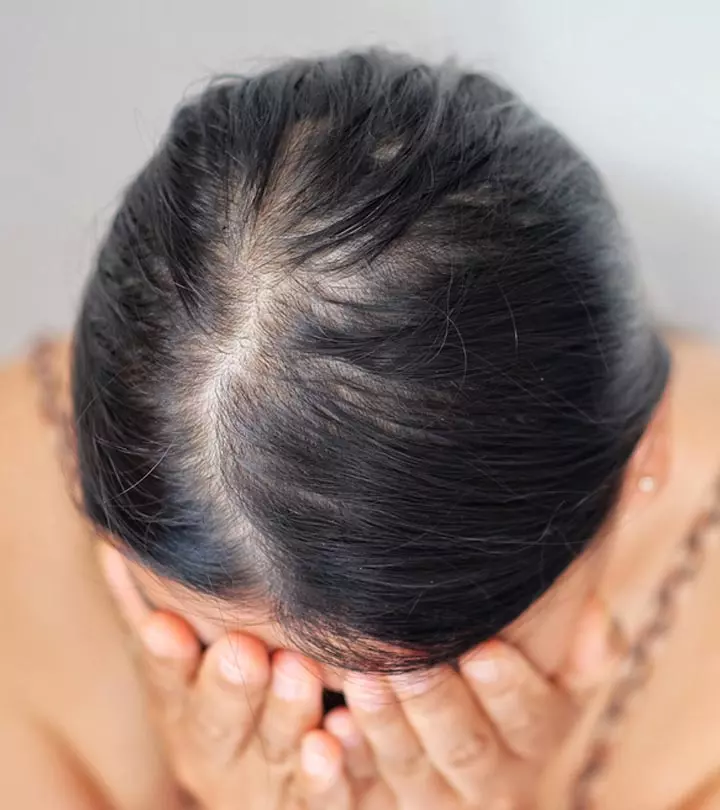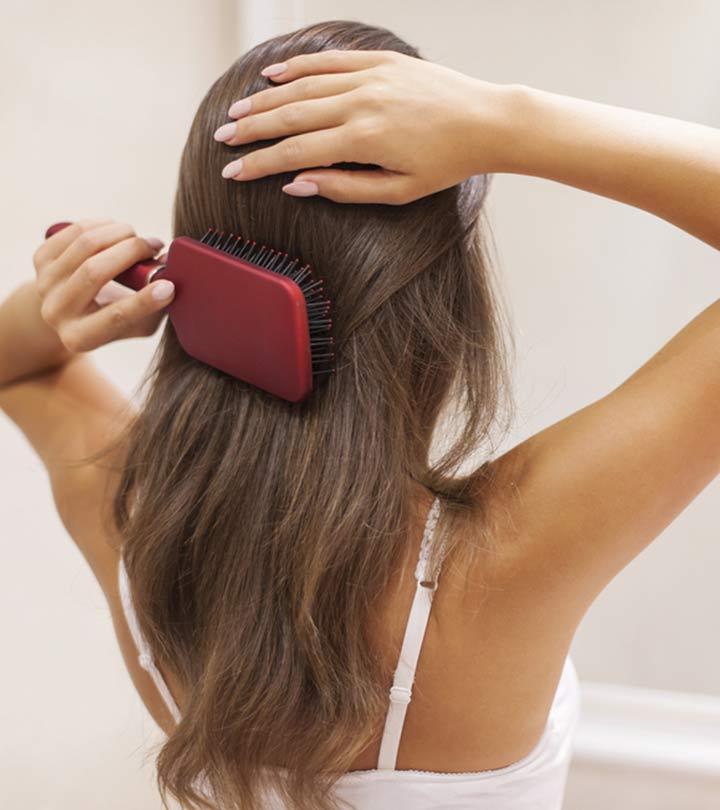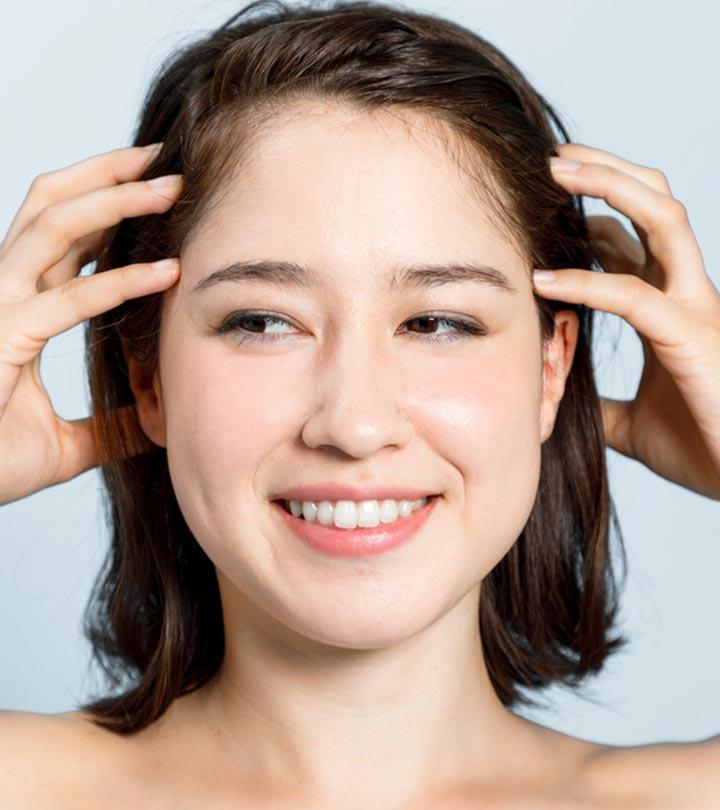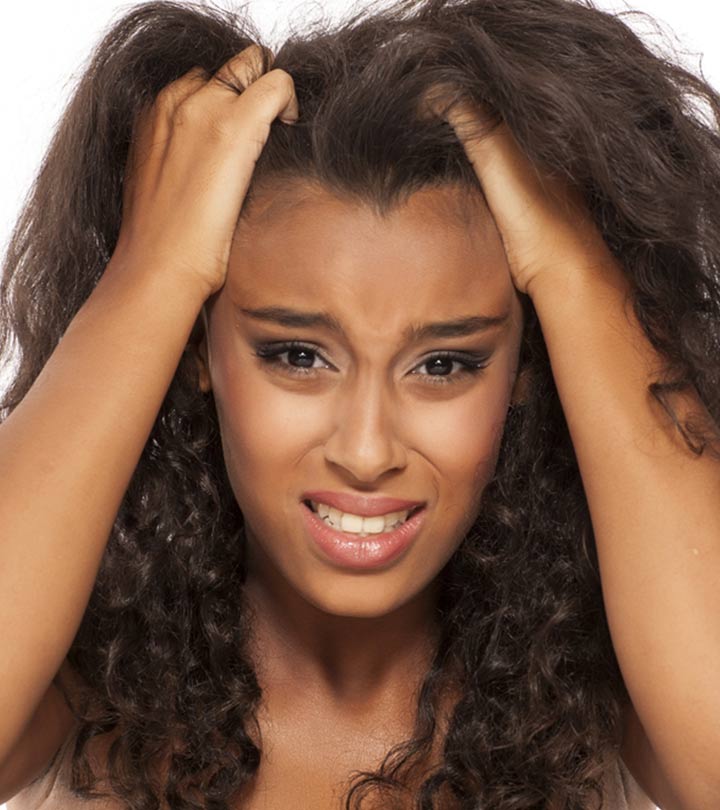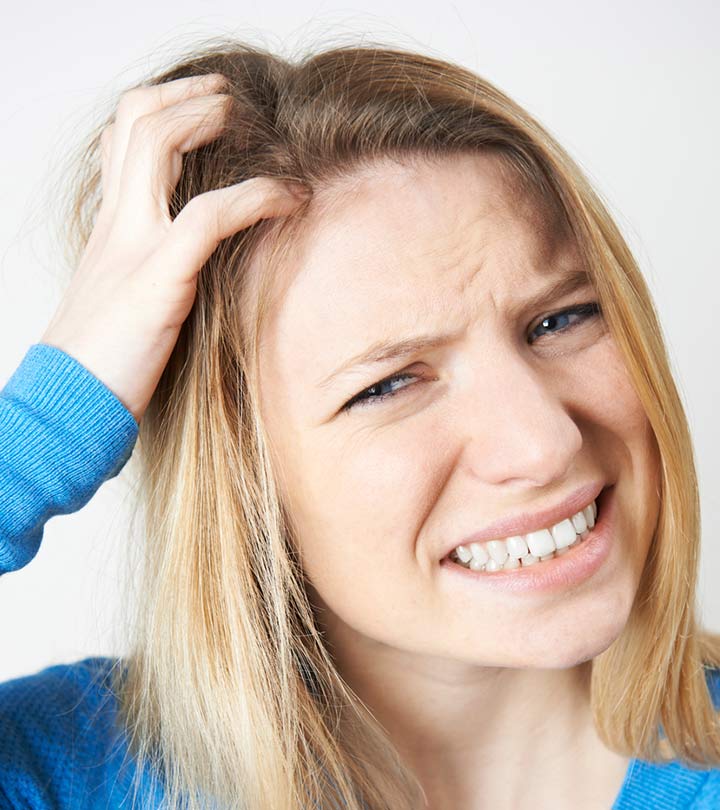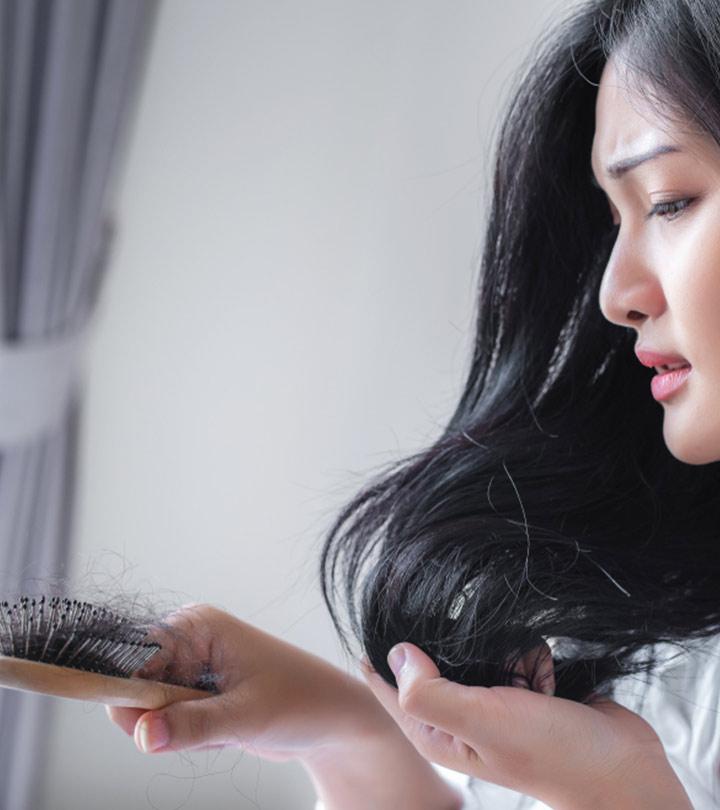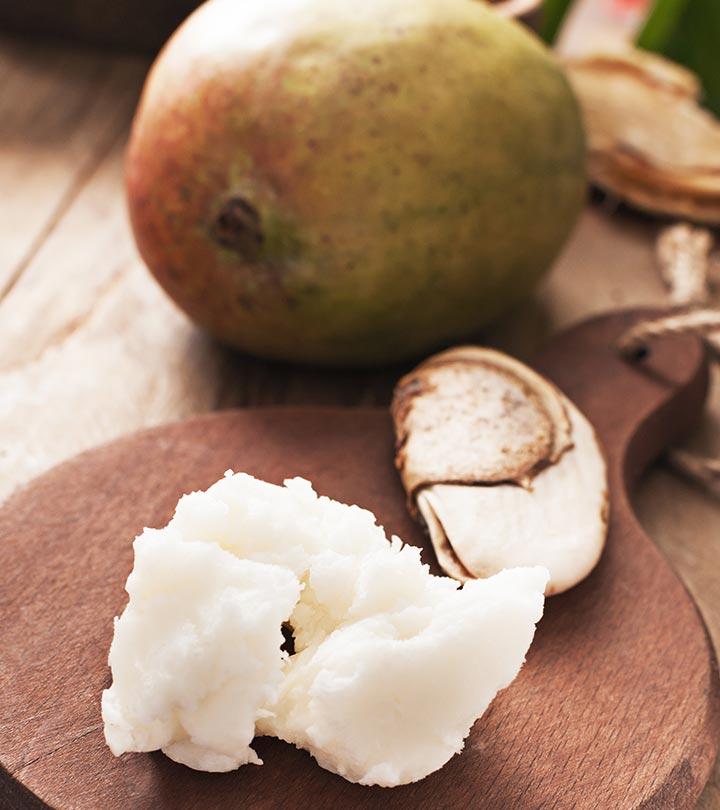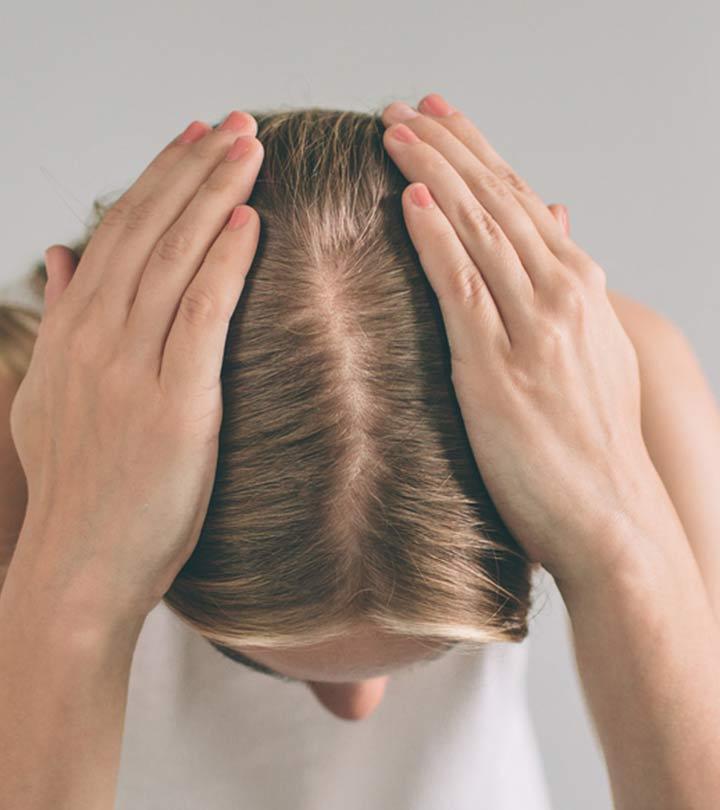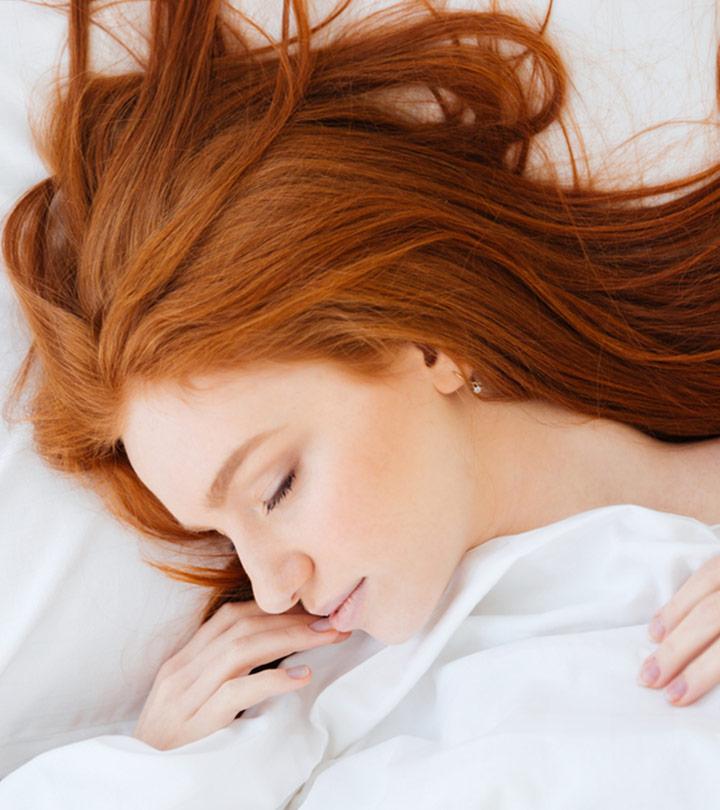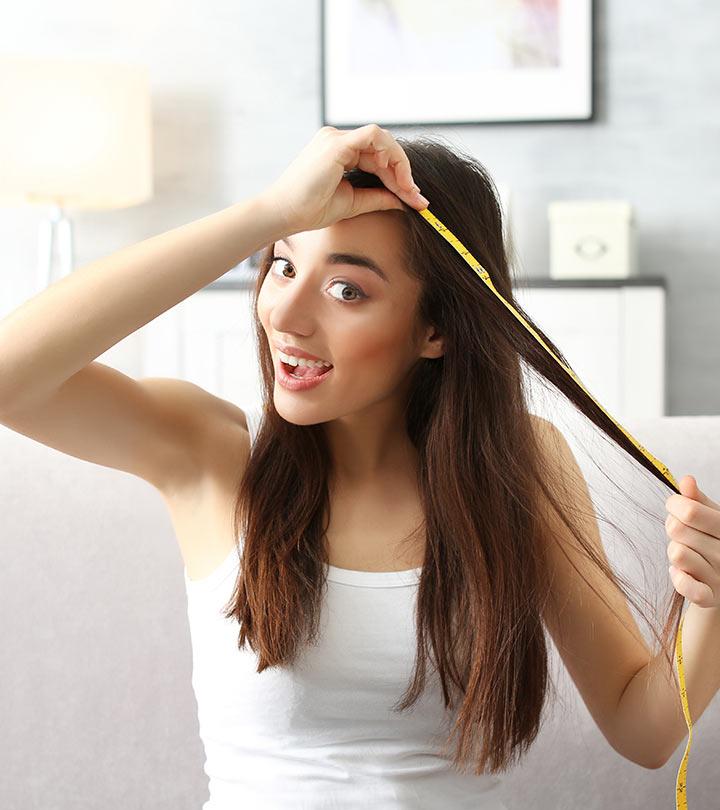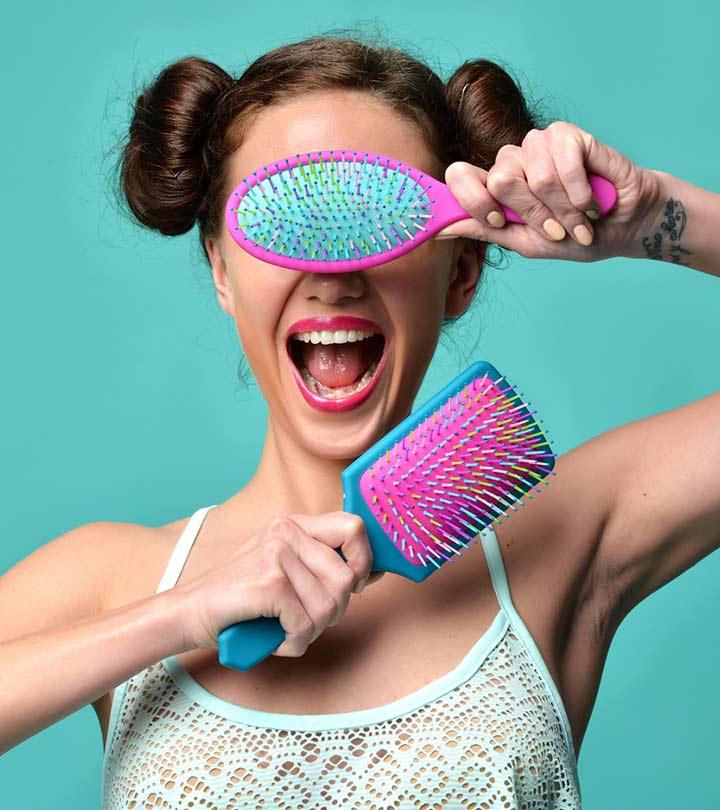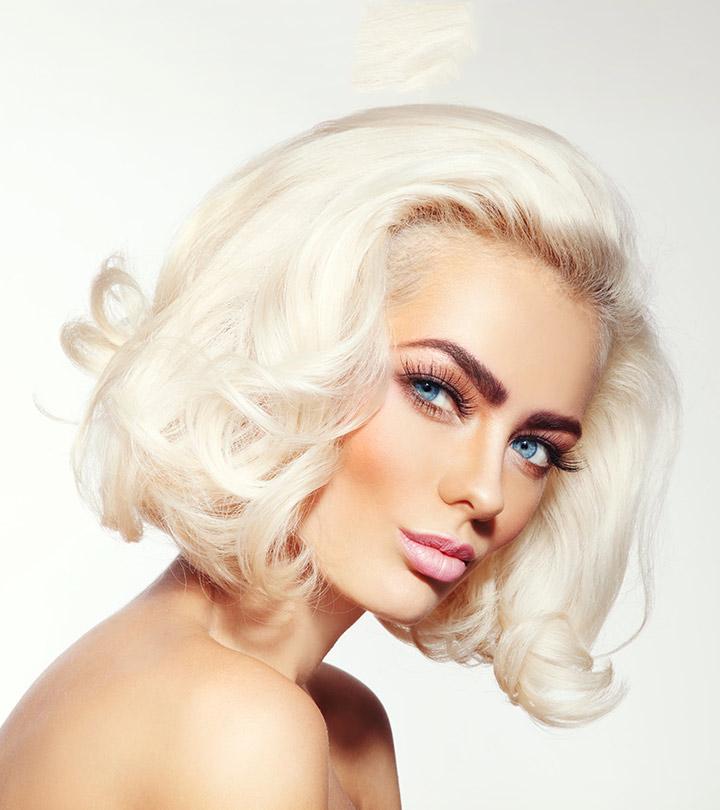Hair Loss In Teens – Causes, Symptoms, And Treatment
Managing this excessive shedding may require addressing underlying nutrient deficiencies.
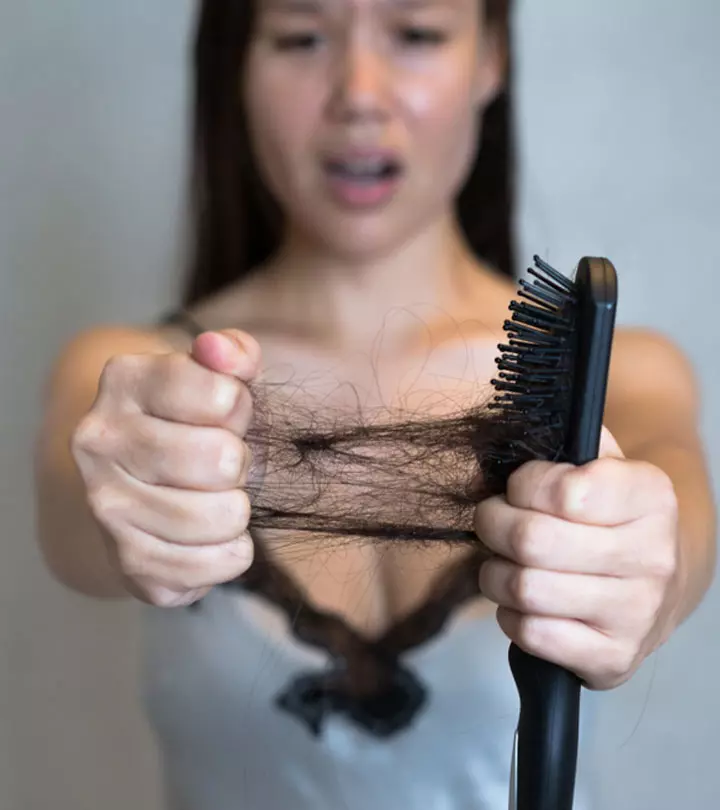
Image: Shutterstock
Along with adolescence comes early signs of hair loss. It is true that hair loss in teens is a common occurrence. Losing your hair as a teenager can be overwhelming and stressful. But the good news is that most cases of teenage hair loss can be reversed. Successfully treating teenage hair loss needs one to understand its causes. Read to learn what causes hair to fall out during the teen years, the symptoms to look for, and the treatment options available.
In This Article
What Causes Hair Loss In Teenagers?
Excess stress, lack of sleep, and crash diets can cause hair loss in a teenager. Nutritional deficiencies, hormonal imbalances, and bad hair care practices are the other common culprits. Serious medical conditions such as autoimmune, genetic, and psychological disorders may also cause hair loss (1). These conditions require immediate medical attention.
Here, we elaborate on the many causes of hair loss in teenagers.
1. Hormonal Changes
Hormonal changes during puberty and adolescence can lead to hair loss. Thyroid and reproductive hormones regulate hair growth, and their imbalances can lead to hair loss (1). Hair loss related to thyroid disorders is common in both males and females. Hair loss in females related to PCOS may start in the early teenage years (2).
As individuals age, the likelihood of experiencing hair loss tends to increase. However, it is generally considered abnormal for individuals under the age of 30 to experience significant balding without any reason, as stated above. In a survey involving 32,601 U.S. adults, a substantial majority of individuals aged 18 to 24 expressed concern about hair loss. 59% of men and 57% of women in this age group reported a notable level of anxiety and fear related to the prospect of losing their hair.
2. Inadequate Nutrition
Poor eating habits, including the consumption of processed foods containing refined flour and sugar, can lead to nutrient deficiencies. Anemia (caused due to iron deficiency), bulimia, anorexia, and crash diets are the common causes of teenage hair loss (3).
3. Excess Stress
Teenagers undergo physical and mental changes that can cause a lot of stress. Academics, family obligations, social and personal relationships, and peer pressure can take a toll on their mental health. This can lead to hair loss(1).
4. Medications
Acne is a common problem in teens. Anti-acne medications, antibiotics, and antidepressants may cause hair loss. Birth control pills may disrupt hormones resulting in hair loss (1). In a few cases, the hair loss may be temporary and could stop once the medication is discontinued. It is recommended to consult a doctor if the problem persists.
5. Over-Styling
Using hair styling tools (blow dryers, hair straighteners, and curling irons)too often can cause hair damage and breakage. Dyeing, perming, straightening, and relaxing one’s hair too frequently can also result in hair loss (4).
 Pro Tip
Pro Tip6. Traction Alopecia
Traction alopecia is a form of hair loss caused due to force or friction. Tight hairstyles like buns and braids, helmets, sports gears, and overhead earphones can also cause hair loss (5). Wearing the same hairstyle or using extensions often may also contribute to hair loss.
7. Trichotillomania
This is a behavioral disorder where the person compulsively pulls out their hair, resulting in bald patches on the scalp (6). This psychological disorder is more common in females (7).
8. Polycystic Ovary Syndrome
Polycystic ovary syndrome (PCOS) may trigger hair loss in teens due to hormonal imbalances, inhibiting the hair growth cycle. Elevated androgen levels associated with PCOS may lead to increased hair thinning and shedding (8).
9. Lupus Hair Loss
Lupus is an autoimmune disease that can cause hair loss in teens due to the immune system mistakenly attacking the hair follicles. This condition is commonly known as lupus-induced alopecia, which often results in hair thinning and patches of hair loss (9). Factors like inflammation and medication side effects can contribute to this phenomenon. Early diagnosis and a comprehensive treatment plan, including medications and lifestyle adjustments can help in managing lupus-related hair loss in teenagers.
Some other causes of hair loss may include:
1. Androgenic Alopecia
Androgenic hair loss in males can be observed as a receding hairline. In females, it causes the overall hair thinning on the scalp (10).
2. Alopecia Areata
This is an autoimmune disorder where the body attacks its own hair follicles (11).
3. Medical Conditions
Scalp conditions such as psoriasis, eczema, seborrheic dermatitis, and fungal infections may lead to balding spots and hair loss(12).
These are the most common causes of hair loss in teens. Identifying the early signs of teenage hair loss can help them take preventive measures.
Early Signs Of Teenage Hair Loss
- A Receding Hairline (In Males)
We all lose hair as we age. A natural loss in hair can be observed in males as a maturing hairline. It is an even hairline that changes from adolescence. However, an uneven hairline or sudden hair loss near the temples could be one of the early signs of hair loss. This receding hairline in the teen years can signal deeper issues that need to be addressed.
- A Thinning Crown (In Females)
In women, hair loss occurs as a uniform thinning of the scalp. This results in scanty hair or balding at the crown. Women are recommended to monitor their hair loss as it can often go unnoticed. Areas exposing your scalp, wispy hair, and excess hair breakage are among the early signs of teenage hair loss in females.
- Noticeable Hair On Pillows Or In Bathroom Drains
Hair clogging the drains or excess hair strands on the pillow could mean trouble. Keep a tab on the hair loss pattern. Seek professional help if the hair loss is more than usual.
- Itchy, Flaky Scalp
An itchy, flaky scalp could often be a symptom of psoriasis, eczema, and seborrheic dermatitis. Constant scratching, pulling, and tugging at your hair can lead to hair breakage
- Thin, Wispy Hair Growth
Losing hair every day is normal. However, regrown hair that is thin and wispy could be a cause for concern.
How To Treat Hair Loss In Teenagers
Holistic approaches are much safer to treat hair loss in the early teenage years. A healthy diet, hormonal supplements, and a good hair care routine can prevent hair loss.
1. Anti-Fungal Treatments
Anti-fungal medicines, emollients, and treatments can help treat different scalp conditions (13). Seek a medical professional for a proper diagnosis.
2. Medication And Nutritional Supplements
Consult a doctor and check for nutritional deficiencies. These can be corrected with medicines and nutritional supplements.
3. Hair Transplants
Wigs and hair extensions can help you cover bald spots. This approach could be cosmetic and superficial but can help fight social anxiety and embarrassment associated with hair loss, especially in teenagers. In severe cases, hair transplants may be necessary. It
4. Treatments For Hormonal imbalances
Fortunately, thyroid disorders like hypothyroidism or hyperthyroidism can be managed with medication. The hair can regrow as the hormone levels revert to normal levels. PCOS-related hair loss can be treated with anti-androgens, oral contraceptive pills, and medications such as minoxidil or finasteride (14), (15).
Brock shares his experience of teenage hair loss, which started at 18. He said, “I noticed a little bit of recession in the temple area (i).” His hairline recession problem got worse as he was having a blood disorder and he was on prescription drugs. He added, “The very first thing I did was I got a minoxidil, also known as Rogaine. I got some great results with it that I did for about six months and still use it.”
5. Better Diet Habits
A healthy diet is especially important for teenagers. Their rapid physical development would need more energy and nutrients. Nutritional deficiencies can lead to impaired hair growth and hair loss. Consuming foods rich in omega-3s, iron, zinc, vitamins, and protein can help. Green leafy vegetables, nuts, and whole grains are an added advantage. Nutritional supplements (multivitamins, collagen, biotin, and iron) could also help(16). Avoid processed foods like burgers, pizzas, sugary pastries, etc.
 Pro Tip
Pro Tip6. Reduced Over-Styling
Reduced use of hot tools or harsh chemicals can promote hair regrowth. Thermal protectants and regular hair trims can also help. Do not tie your hair into a tight bun or ponytail. Reduce the use of headgear and have a good hair care routine.
While these treatments may help reduce hair loss, taking preventive measures may stop its recurrence. Take note of the following remedies.
Remedies To Prevent Hair Loss
- Wash your hair regularly. Do not brush damp or wet hair.
- Avoid hair care products with sulfates, alcohol, artificial dyes, and parabens.
- Be gentle with your hair. Avoid tugging or vigorous brushing.
- Use hair masks, serums, detanglers, protectants, and natural oils.
- Have a dedicated fitness regime.
- Fix the underlying stress factors. A healthy school-life balance and a good exercise routine can help fight stress. Severe cases may require psychological guidance.
- Sleep for 7 to 8 hours every night.
- Massage your scalp for boosting blood circulation.
Hair loss in teens is common and stressful. However, you can reverse this by following a proper hair care routine and lifestyle. Hormone fluctuations, nutritional deficiencies, stress, medications, behavioral disorders, and other medical conditions cause early hair loss in teens. There are several ways to treat the issue, like hair transplants, medications, supplements, and anti-fungal treatments. Following a healthy and balanced diet can also help combat hair loss in teens. You may also follow the tips discussed above to prevent hair loss. Consult your doctor if these methods do not show any results.
Frequently Asked Questions
How much hair loss is normal for a teenager?
Losing 50 to 100 strands of hair a day is considered normal for a teenager.
What vitamin should I take for hair loss?
Biotin (vitamin B7) can improve hair growth and control hair loss (1). However, it may work only if the hair loss is due to biotin deficiency. Consult a doctor before taking any supplements.
Can you start balding at 16?
Yes. While it is uncommon, balding can begin as early as 15 or 16 years of age in the form of hair thinning or receding hairline.
Key Takeaways
- Excess stress, lack of sleep, crash diets causing nutritional deficiencies, hormonal imbalances, and bad haircare practices are commonly responsible for hair loss in teenagers.
- Right lifestyle changes with proper diet and adequate rest and in some cases, medication can help to treat and reverse this hairloss.
- Avoiding excessive use of hair products, especially with harsh chemicals, styling and wet hair brushing or forceful brushing can prevent hairloss to a great extent.
Watch the following video to discover expert advice and DIY home remedies to prevent hair loss in teens. It shares the best practices and practical tips to maintain healthy hair and equip yourself with effective strategies.
Personal Experience: Source
StyleCraze's articles are interwoven with authentic personal narratives that provide depth and resonance to our content. Below are the sources of the personal accounts referenced in this article.
(i) Teenage Hair Loss – Brock’s Storyhttps://www.youtube.com/watch?v=2UX7KKbmKCU
References
Articles on StyleCraze are backed by verified information from peer-reviewed and academic research papers, reputed organizations, research institutions, and medical associations to ensure accuracy and relevance. Read our editorial policy to learn more.
Read full bio of Dr. Shruti Chavan
Read full bio of Eshna Das
Read full bio of Swathi E





